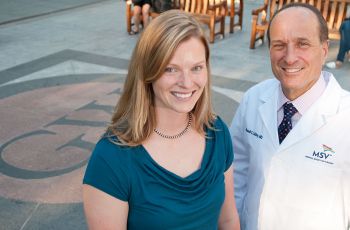News Archive
Saba Ghorab, a second year medical student at the George Washington University School of Medicine and Health Sciences (SMHS), remembers the day in January 2010 when a 7.0 magnitude earthquake struck Haiti.
Numerous studies and clinical trials have demonstrated that the use of Automated External Defibrillation devices (AEDs) can dramatically increase the survival rate of someone who suffers “sudden cardiac arrest,” (SCA), especially in high-density public places, such as shopping malls, hotels,…
Bi-Dar Wang, Ph.D., assistant research professor of Pharmacology and Physiology at the GW School of Medicine and Health Sciences, is quoted in an article about a report he co-authored examining the genetic reasons why black men in the US are more likely to suffer from and become victims of…
Yavar Moghimi, M.D., clinical instructor of Psychiatry and Behavioral Sciences at the GW School of Medicine and Health Sciences, is quoted in an article about a program he proposed using the Capital Bikeshare program as therapy for patients on the premise that physical activity is good for…
Richard Kovar, MD ‘80, was named 2012 Family Physician of the Year by the American Academy of Family Physicians.
Leonard Wartofsky, M.D., M.P.H., who earned four degrees from GW, was one of five distinguished alumni who received this year’s Alumni Achievement Awards. The award are the highest form of recognition that the University and the GW Alumni Association bestow upon alumni each year.
Allison Hoff had nearly exhausted her five minutes at an internet café when the e-mail arrived.
Dr. Esther Roberts, clinical professor of Psychiatry and Behavioral Sciences in the GW School of Medicine and Health Sciences, developed the Mental Health Program within the US Department of State in 1980.
James Cawley, MPH, PA-C, professor in both the GW School of Public Health and Health Services and the GW School of Medicine and Health Sciences, and founder of the joint PA/MPH program at GW--the first of its kind in the country--had a compendium of his writings compiled by Advance for NPs…
Today, more than 500 first- and second-year medical and health science students, faculty, and staff from SMHS scooped, measured, and bagged meals made of rice, dehydrated vegetables, soybeans, and 21 vitamins and minerals. In partnership with the DC Chapter of Kids Against Hunger, they assembled…
